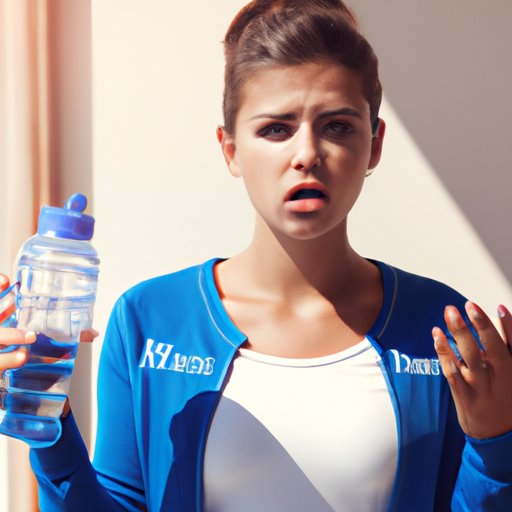Introduction
Dehydration is a condition that occurs when the body does not have enough fluids. When the body lacks water, it can no longer function properly and organs may become damaged. It is important to recognize the signs and symptoms of dehydration so that you can take the necessary steps to prevent it from occurring or treat it quickly if it does. This article will explore the signs and symptoms of dehydration, how to test for it, and tips for staying hydrated.
Signs and Symptoms of Dehydration
The most common sign of dehydration is thirst. If you feel thirsty, it is an indication that your body needs more fluids. Other signs and symptoms of dehydration include dry mouth, headache, fatigue, muscle cramps, and dark urine.

The Role of Urine Color in Detecting Dehydration
Urine color can be used as an indicator of dehydration. A normal urine color is pale yellow. When the body is dehydrated, the urine becomes darker or more concentrated. Dark or concentrated urine indicates that there is not enough fluid in the body.

The Effects of Dehydration on the Body
When the body is dehydrated, it can cause a number of problems. Dehydration can lead to a loss of electrolytes, which are essential for proper functioning of the body. It can also cause low blood pressure and heat exhaustion. In extreme cases, dehydration can lead to kidney stones.
Warning Signs of Severe Dehydration
In some cases, dehydration can become severe and require medical attention. Warning signs of severe dehydration include confusion, fainting, rapid heartbeat, and unconsciousness. If you experience any of these symptoms, seek medical help immediately.
Tips for Staying Hydrated
The best way to prevent dehydration is to stay hydrated. Drink plenty of water throughout the day and avoid drinks with caffeine. Eating foods high in water content such as fruits and vegetables is also beneficial. Additionally, monitor your activities and make sure to drink enough fluids while exercising or working in hot conditions.
Benefits of Drinking Water
Drinking plenty of water has many benefits. It helps to improve digestion, boosts energy levels, enhances mental clarity, and improves physical performance. Staying hydrated is essential for overall health and wellbeing.

How to Treat Dehydration at Home
If you are experiencing mild dehydration, there are a few steps you can take to treat it at home. First, increase your fluid intake by drinking plenty of water. An electrolyte supplement can also be helpful. Additionally, rest and avoid strenuous activities until you are feeling better. If your symptoms persist, seek medical help.
Conclusion
Dehydration is a condition that occurs when the body does not have enough fluids. Recognizing the signs and symptoms of dehydration is important so that you can take the necessary steps to prevent it or treat it quickly. Drinking plenty of water, avoiding caffeine, eating foods high in water content, and monitoring your activities are all important steps to take to stay hydrated. If you are experiencing mild dehydration, you can treat it at home by increasing your fluid intake and using an electrolyte supplement. If your symptoms persist, seek medical help.
(Note: Is this article not meeting your expectations? Do you have knowledge or insights to share? Unlock new opportunities and expand your reach by joining our authors team. Click Registration to join us and share your expertise with our readers.)
